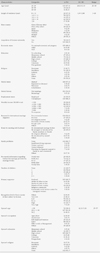Abstract
Purpose
The purpose of this study was to investigate the current status of international marriage migrant women living in Daegu and Kyungpook area, and to identify the impacts of social support and life satisfaction on their
depression in this population.
Methods
Research objectives were accomplished by conducting an anonymous questionnaire survey with 173 international marriage migrant women. Data were analyzed using descriptive analysis, Pearson correlation coefficients and stepwise multiple regression with SPSS/WIN 18.0.
Results
Compared to international marriage migrant women living in other areas, international marriage migrant women living in Daegu and Kyungpook area had differences in their host country, level of education and spouses' occupation. The most frequently used social support programs for participants were classes in Korean language (Hangul), Korean culture and tradition and on the National Health Insurance Service. Women who received higher levels of social support reported less depression and greater life satisfaction compared to women receiving lower levels of social support. The significant predictors of depression were social support and life satisfaction showing 27.8% of the variance in depression.
Figures and Tables
References
1. Ahn OH, Jeon MS, Hwang YY, Kim KA, Yoon MS. An analysis of articles for international marriage immigrant women related to health. J Agric Med Community Health. 2010; 35(2):134–150.

2. Ahn HR. The experience of Korean-American women's acculturative stress. J Korean Acad Psychiatr Ment Health Nurs. 2007; 16:160–173.
3. Arieli A, Gilat I, Aycheh S. Suicide among Ethiopian Jews: A survey conducted by means of a psychological autopsy. J Nerv Ment Dis. 1996; 184:317–319.
4. Bae J, Park H. Depression and the influencing factors in Korean American immigrants. J Korean Acad Psychiatr Ment Health Nurs. 2010; 19:67–75.

5. Beiser M. Migration: Opportunity or mental health risk. Triangle. 1990; 29(2/3):83–90.
7. Cho MJ, Bae JN, Suh KH. Diagnostic validity study for Korean geriatric depression scale (GDS). J Korean Neuropsychiatr Assoc. 1999; 38:48–63.
8. Cho MJ, Chang SM, Hahm BJ, Chung IW, Bae A, Lee YM, et al. Prevalence and correlates of major mental disorders among Korean adults: A 2006 National epidemiologic survey. J Korean Neuropsychiatr Assoc. 2009; 48:143–152.
9. Faul F, Erdfelder E, Buchner A, Lang AG. Statistical power analyses using G*Power 3.1: Tests for correlation and regression analyses. Behav Res Methods. 2009; 41:1149–1160.

10. Fenta H, Hyman I, Noh S. Determinants of depression among Ethiopian immigrants and refugees in Toronto. J Nerv Ment Dis. 2004; 192:363–372.

11. Han JE. The effect of acculturation and social support on the child rearing efficiency of immigrant mothers for marriage. Seoul: Sungkyunkwan University;2007. Unpublished master's thesis.
12. Hoschl C, Ruiz P, Casas M, Musalek M, Gaebel W, Vavrusova L. The impact of migration on mental health and mental illness. Eur Psychiatry. 2008; 23:S42.

13. Huang YC, Mathers NJ. Postnatal depression and the experience of South Asian marriage migrant women in Taiwan: Survey and semi-structured interview study. Int J Nurs Stud. 2008; 45:924–931.

14. Jeong GS, Kim YH, Park KE, Lee EA, Park JH, Lee SA, et al. Current status and Policy development for social support for the international marriage migrant women living in Kyeonggido. Kyeonggido: Kyeonggido Family & Women's Research Institute;2008.
15. Kim H, Yoo S, Cho S, Kwon E-J. Health status and associated health risks among female marriage immigrants in Korea. J Korean Soc Health Educ Promot. 2010; 27(5):79–89.
16. Kim HS. International marriage migrant women in Korea. Korean J Women Health Nurs. 2008; 14(4):248–256.

17. Kim HS. Social integration and heath policy issues for international marriage migrant women in South Korea. Public Health Nurs. 2010; 27:561–570.

18. Kim NY. A study on life satisfaction about international marriage of women immigrants: Focus on social support and social participation. Seoul: Ewha Womans University;2007. Unpublished doctoral dissertation.
19. Kim SK, Kim YK, Cho AJ, Kim HR, Lee HK, Seol DH, et al. Survey on multi-culture family in South Korea. Seoul: Ministry of Health and Welfare, Ministry of Justice, Ministry of Gender Equality & Family, Korea Institute for Health & Social Affair;2010.
20. Kwon KY, Park KW. Factors influencing on mental health of international marriage migrant women: Among international marriage migrant women living in Jeollanamdo. Korean Sociol Res. 2007; 14:187–219.
21. Lee CE. A study on the relationship between perception of sex life and life satisfaction in elderly. Seoul: Hanyang University;1999. Unpublished master's thesis.
22. Lee SJ, Kim YH, Choi JS. A study on globalization and migration of women in Asia. Seoul: Korean Women's Development Institute.
23. Lim HS. The impact of acculturative stress and perceived social support on depression of marriage-based immigrant women in Korea: An examination of moderating and mediating effects of social support. Korean J Fam Welf. 2010; 15(2):27–45.
24. Ministry of Health and Social Welfare. The reality of female international marriage migration and support policies for their health and social welfare of the Korean government. Seoul: Author;2005.
25. Neugarten BL, Havighurst RJ, Tobin SS. The measurement of life satisfaction. J Gerontol. 1961; 16(2):134–143.

26. Park JW. Study on the development of social support scale. Seoul: Yonsei University;1985. Unpublished doctoral dissertation.
27. Sheikh JI, Yesavage JA. Geriatric depression scale (GDS): Recent evidence and development of a shorter version. In : Brink TL, editor. Clinical gerontology: A guide to assessment and intervention. NY: The Haworth Press;1986. p. 165–173.
28. Statistics Korea. Statistics of immigrants in Republic of Korea. 2005. Retrieved June 14, 2011. from http://kosis.kr/abroad/abroad_01List.jsp.
29. Statistics Korea. Korean census. 2006. Retrieved June 14, 2011. from http://kosis.kr/abroad/abroad_01List.jsp.
30. Yang OK, Kim YS. A study on the effects of depressiveness among foreign wives through marriage migration. Ment Health Soc Work. 2007; 26:79–110.




 PDF
PDF ePub
ePub Citation
Citation Print
Print







 XML Download
XML Download